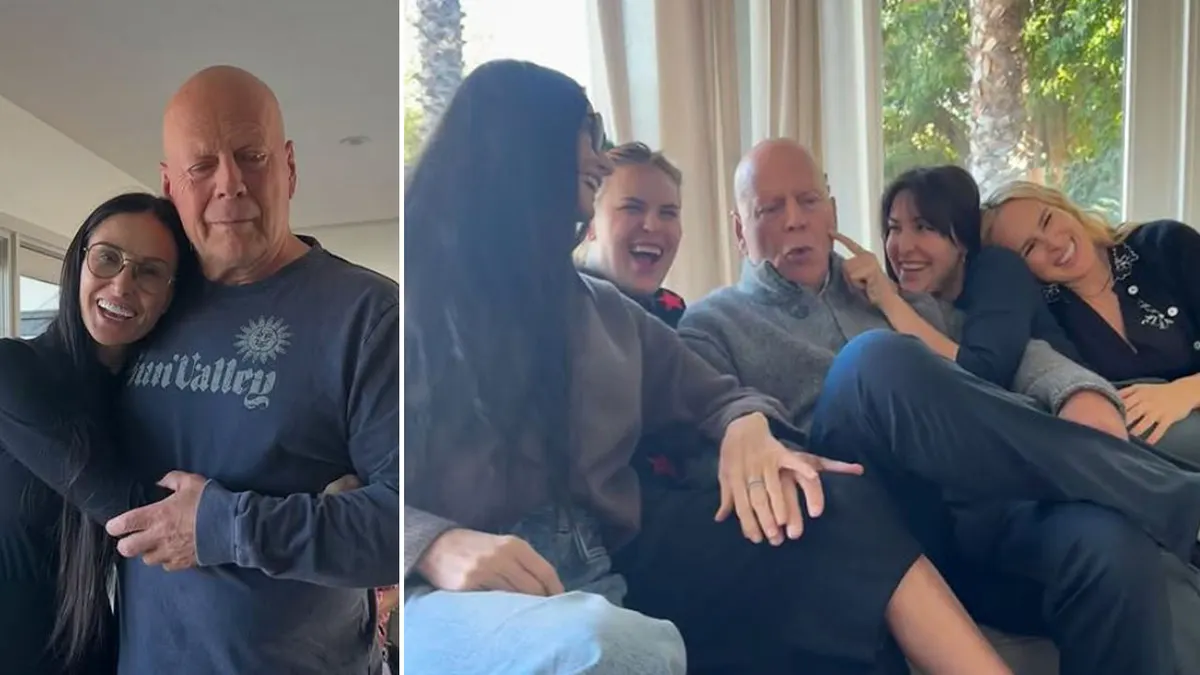“WE MISS HIM EVEN WHEN HE’S HERE” — A close friend says Bruce Willis’s family has learned to cherish the smallest signs: a hand squeeze, a hum to a favorite Sinatra song. It’s like watching a sunset you can’t stop… – hghghg
WE MISS HIM EVEN WHEN HE’S HERE — A close friend says Bruce Willis’s family has learned to cherish the smallest signs: a hand squeeze, a hum to a favorite Sinatra song. It’s like watching a sunset you can’t stop.
In a quiet corner of Los Angeles, far from the relentless glare of the red carpet and paparazzi flashes, Bruce Willis exists in a world that few could have imagined for a man whose life has been lived so publicly. Known for his explosive action roles, his razor-sharp wit, and the charisma that made him one of Hollywood’s most beloved figures, Willis now navigates the profound, often heartbreaking reality of frontotemporal dementia. For those closest to him, the experience is paradoxical: they have him physically present, yet emotionally, in many ways, he is slipping away.

A family friend, speaking on condition of anonymity, explains the delicate routine that has become the fabric of their daily lives. “They notice everything,” the friend says, voice thick with emotion. “A slight squeeze of the hand. A soft hum along to a Sinatra classic. The way his eyes catch the sunlight in the kitchen. These moments are treasures, as if the world has shrunk to contain only what is most essential: presence, love, connection.” In a life once defined by action and spectacle, the smallest gestures have taken on monumental significance.
Dementia is often described as a thief, but its cruelty lies in the subtleties it steals—the spontaneous laugh, the sharp retort, the recognition in a glance. For someone like Bruce, whose public persona has always been larger than life, the disease transforms intimate spaces into arenas of vigilance and tenderness. His daughters have reportedly taken on the role of chroniclers, carefully noting each flicker of recognition in journals that may one day serve as the only testament to their father’s presence. These records are not for the public; they are a private archive of fleeting victories, a way to hold onto the man who built his career on being unforgettable.
Family life, once marked by casual mornings and spontaneous outings, is now deliberate and deeply intentional. Breakfasts are punctuated by music—favorites like Frank Sinatra or Nat King Cole—a soundtrack chosen to provoke memory and spark recognition. If Bruce hums along, the daughters record it mentally and in writing, aware that such moments may not be repeated. Even the simplest interactions—a hand placed gently on a shoulder, a shared laugh over a remembered joke—are infused with extraordinary significance. Each gesture is simultaneously ordinary and miraculous.

This paradox—missing someone even when they are physically present—is the essence of what psychologists term “ambiguous loss.” Families of dementia patients confront grief without closure, mourning someone who remains alive but whose presence is altered in essential ways. For the Willis family, this grief is coupled with a vigilant celebration of each spark of recognition, each fragment of personality that surfaces amidst the fog of memory loss. “You see him, you touch him, you talk to him, and sometimes it feels like he is slipping through your fingers,” the friend explains. “But then he smiles, or hums, or squeezes a hand, and it is enough—enough to remind you who he is, and who he always will be.”
Public perception often clings to the icon—the actor on screen, the man in headlines—but dementia transforms the lens. Bruce Willis, once celebrated for cinematic heroism, now offers a subtler, quieter lesson in courage and presence. Watching him is like observing a sunset: breathtaking, inevitable, and impossible to hold. Each moment of clarity is luminous precisely because it is transient. Fans may not witness these private, intimate moments, yet through them, the world can grasp the human reality behind the celebrity.
Friends and former co-stars have spoken about the remarkable devotion displayed by Willis’s family. One described an afternoon visit in which simple routines—a shared song, a playful exchange—became exercises in patience and love. “It’s extraordinary,” the friend said. “They create joy out of what many would see as loss. There’s an intentionality to everything, a kind of sacred choreography of care. It’s both heartbreaking and profoundly inspiring.”
:max_bytes(150000):strip_icc():focal(894x222:896x224)/bruce-willis-cuddles-lou-in-sweet-photo-032025-1-5310f0ea0d87471badd95481c8b874de.jpg)
This meticulous attention to the smallest details is not merely sentimental. Research has shown that for dementia patients, familiar routines, music, and tactile gestures can provoke emotional and cognitive engagement, moments of lucidity that reconnect them, if only briefly, with their identity and with loved ones. The Willis daughters’ attentiveness, therefore, is both an act of love and a form of intervention—an effort to preserve dignity and humanity against the inexorable tide of memory loss.
The contrast between public perception and private reality could not be more stark. Fans remember Bruce Willis for his iconic roles in Die Hard, Pulp Fiction, and The Sixth Sense—characters who were decisive, fearless, and often unflinching in the face of danger. The private Bruce, as his family experiences him today, is defined not by explosions or cinematic triumphs, but by a delicate interplay of recognition and forgetfulness, laughter and silence, touch and music. Yet it is precisely in this fragility that his family finds profound meaning.
A family friend reflects on the emotional intensity of these days: “There is a grief that comes even in joy. You hold his hand, and he smiles, and yet you are already mourning what you may never get back. It’s like witnessing the beauty of a sunset, knowing it will vanish the moment you turn away.” The image is apt: the impermanence of light, the inevitability of change, the human need to bear witness. The family’s daily life, structured around noticing, recording, and cherishing, becomes a meditation on love itself—patient, attentive, and fiercely protective.
Ultimately, the story of Bruce Willis and his family transcends celebrity culture. It is a reminder of shared humanity, the fleeting nature of presence, and the extraordinary power of love in small, intentional acts. In a society obsessed with achievement, visibility, and external validation, the Willis family teaches that true heroism often lies in patience, in mindfulness, and in the tender stewardship of memory and affection.

For fans, colleagues, and strangers alike, the message is poignant: cherish the moments, even when they are brief. Celebrate recognition, laughter, and touch, for they are both fragile and sacred. Bruce Willis, a man who has thrilled audiences worldwide, now offers a quiet, enduring lesson in the essential human capacity to love in the present, even as the past slips away.
As the day wanes in Los Angeles, bathing the city in golden light, the family gathers, observing the most subtle of signs: a hand held, a hum, a fleeting smile. And though they miss him even while he is here, they find solace in presence, resilience in care, and beauty in the smallest gestures. They remind the world that while fame may fade, love endures—measured not in accolades, box office returns, or cinematic achievements, but in the quiet, persistent attention to someone who matters, here and now.
Bruce Willis’s story, in this chapter of life, is not about action sequences or heroic feats on screen. It is about human heroism in its most intimate form: presence, devotion, and the courage to love someone, fully and without reservation, even when the landscape of memory is shifting beneath your feet. And in watching them, the world can learn to treasure not only those we remember, but also those we hold, fleetingly, in the moment.


